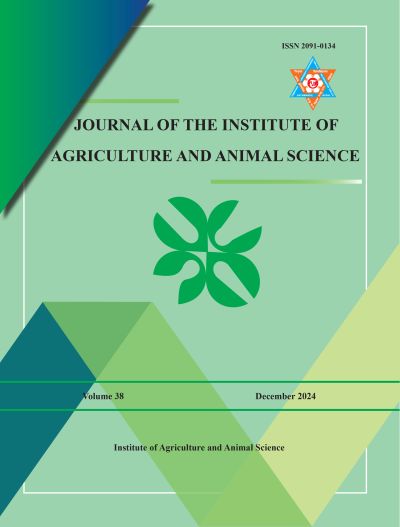Assessing the Contribution of Nutrients to Yield of Rice Varieties through Omission Plot Techniques in Lamjung, Nepal
DOI:
https://doi.org/10.3126/jiaas.v38i1.73073Keywords:
growth, yield, economics, rice, LamjungAbstract
As fertilizers are considered productivity-enhancing inputs of agriculture, field research was conducted to canvass the contribution of fertilizers through meticulously designed omission plots. A field experiment was conducted during the rainy season 2018 at Sundarbazar-7, Lamjung. The experiment's main objective was to evaluate soil's nutrient-supplying capacities and estimate nutrient requirements in hybrid (US312) and inbred (Sukhadhan-2) rice varieties. The experiment was carried out in RCBD with three replications and 10 treatments.: US 312+60:30:20kg NPKha-1 (T1), US312+0:30:20kg NPKha-1 (T2), US312+60:0:20kg NPKha-1 (T3), US312+60:30:0kg NPKha-1 (T4), US312+0:0:0kg NPKha-1 (T5), Sukhadhan-2+60:30:20kg NPKha-1 (T6), Sukhadhan-2+0:30:20kg NPKha-1 (T7), Sukhadhan-2+60:0:20kg NPK ha-1 (T8), Sukhadhan 2+60:30:0kg NPK ha-1 (T9), Sukhadhan-2 +0:0:0kg NPKha-1 (T10). Results revealed that the highest grain yield was obtained from T1 (4.98 t ha-1) followed by T4 (4.76 t ha-1) and T3 (4.54 t ha-1), while the lowest grain yield was obtained from T10 (2.47 t ha-1) which were statistically significant. The highest grain yield of T1, T3, and T4 was positively supported by effective tillers/m2, effective grains/panicle, flag leaf area, green leaf number per culm, panicle length, root length, and weight. Soil test data showed that organic carbon (1.63%) and total nitrogen (0.15%) were also found highest in T1 while the lowest was found in T10 and T7, respectively. The benefit-cost ratio was also highest in T1 (1.98). The use of a hybrid rice variety (US312) with a balanced dose of fertilizer under rainfed conditions would be better to get a higher yield in the western mid-hills of Nepal.
Downloads
Downloads
Published
How to Cite
Issue
Section
License
Copyright (c) 2024 Journal of Institute of Agriculture and Animal Science

This work is licensed under a Creative Commons Attribution-NonCommercial 4.0 International License.

